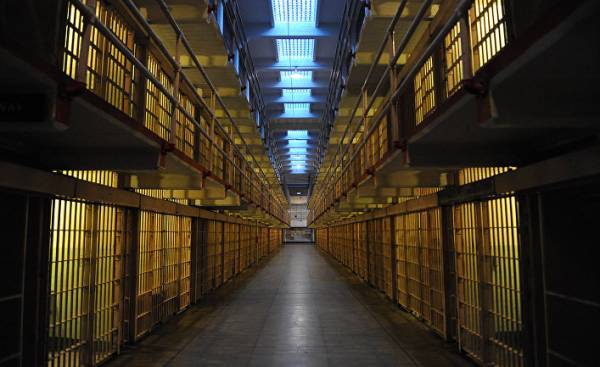
Chapter 1: “This place is ruled by the prisoners”
“Riots have you ever been?” — I ask the recruiter from the prison run by the Correctional Corporation of America (CCA).
“The last was two years ago,” he says into the phone.
“Yes, but they were Puerto Ricans!” — hear the conversation goes in a female voice. “We got rid of them”.
“When can you start?” — asks the man.
I say I need time to think.
Take a breath. Am I really going to be working in the prison guard? Now, when it can actually happen is scary, but the solution seems a bit radical.
I started to look for a job in a private prison, because I wanted to see the inner workings of the industry in which contains 131 thousand of the 1.6 million inmates across the country. The journalist is practically impossible to obtain an unlimited ability to look into our penal system. If prison and let journalists basically only for carefully controlled guided tours and interviews with inmates. Private prisons are especially secretive. Their records often do not obey the laws of open access; CCA fought not to pass a law that would force private prisons to be subject to the same forbidding publication of these rules, comply with their state counterparts. And even if contained in private prisons information without censorship, how could I confirm this? Again, I return to the question of whether there is another way to see the events taking place behind the walls of private prisons?
In CCA, it seemed, really was happy to give me the chance to join his team. For those two weeks that I have submitted the online application form using his real name and personal data, I was contacted by several CCA prisons, and some even more than once.
They were not interested in the details of my resume. They never asked about my experience, the current cooperation with the Foundation for national progress, publisher of Mother Jones magazine — or on why a journalist writing about criminal justice in California, suddenly wanted to drive across the country to get a job in prison. They didn’t even ask about the details of my arrest for shoplifting at the age of 19 years.
When I call the correctional center winn in Winfield, Louisiana, the tube takes a HR lady with a cheerful voice and a pronounced southern accent. “Should pre-warn that they would only pay 9 dollars an hour, but the prison is in the middle of a national Park. You like hunting and fishing?”
“I love fishing”.
“Well, here are many suitable places, and the local love to squirrel hunt. You don’t have to?”
“No.”
“Well, I think in Louisiana you will like it. I know the money is there to pay a little, but say in 7 years can be promoted to warden! The CEO of the company also started a warden”.
In the end, I choose the Wynn. And not only because in Louisiana the highest rate of incarceration in the world (on 100 thousand inhabitants more than 800) — Wynn is the oldest private prison in all of America.
Call the HR and tell the lady that undertake this work.
“It’s clear!” she says.
Over the next 24 hours I go through the verification of their personal data.
Two weeks later, in November 2014, I, having grown a goatee, pulling ears, tunnels and acquiring battered Dodge Ram pickup truck, arrive at Winnfield, inefficient town with a population of 4 600 people within a three-hour drive North from Baton Rouge. I drive by places where it was previously a Mexican restaurant, and now returning with work people can order a Daiquiri, without leaving the car, and down the street between the collapsed wooden houses, and I saw only one dog on a leash. About 38% of local families live below the poverty line and the average income of each farm is 25 thousand dollars. The locals are proud that among U.S. governors — three people from Winnfield. Much less pride is the fact that the last of the town’s Sheriff was imprisoned for trafficking in methamphetamine.
Correctional center winn is located about twenty kilometers from the city, in the middle of a national forest Kisatchie — and it is 600 thousand acres of bog pine trees and dirt roads. I’m going through the dense forest and see a fog appear the outlines of the prison. This sad array of cement buildings and structures made of corrugated metal it can be mistakenly taken for a strangely located the factory, if not for the sign in the spirit of business parks with logo of SSA — head bald eagle inside letter “A”.
At the entrance guard, a woman of about sixty with a gun at the hip, asked me to muffle the truck, open the doors and exit. Tall, severe looking man runs into the cabin a German shepherd. Heart’s racing. I say to the woman that arrived on a four-week training. She points to the building adjacent to the prison fence.
“Good, son,” she says when I pass through the gate. I breathe.
I Park the car, find your class and sit down at the table, along with five other students.
“Nervous?” asks a black guy 19. Call it Reynolds. (I changed the names and nicknames all met in prison of people, if not stated otherwise).
“There is a little — answer — And you?”
“No, I’m in,’ he says. — I saw killed. My uncle has killed three people. The brother sat and cousins too.” In his hands he’s got the scars. One, he says, is the result of a shooting in Baton Rouge. The other he received in the course of street fights in Winnfield. He hit someone with an elbow in the face and then stabbed in the back. “It was a fight with the gangsters”. He says the work he needed only a few months until you go to College. He wants to put into the car speakers. He said he can work on the weekend, so walk, he will most likely every day. “The money will get bundles”. Then he lays his head on the table and falls asleep.
Head of HR Department comes and grumbles at Reynolds for extra quiet time. He brightens up when she says that anyone who will lead on this work each will receive $ 500. She gives other recommendations: not to eat as prisoners; not to engage in sex with them, the fine is 10 thousand dollars or 10 years in a strict regime colony; try not to hurt, because the time spent on sick leave is not paid. If among these prisoners we have friends or relatives, you need to report it. She give out magnets with the hotline number in case of suicidal thoughts or quarrels with family and friends. We provided three free sessions of psychotherapy.
I diligently recorded all voiced, and head of the Department of personnel includes a video where the CEO of the SSA Damon Hininger talks about the joys of working a supervisor at their company. Previously, he was a guard, and in 2015, earned $ 3.4 million, which is almost 19 times more money Director Federal Bureau of prisons. “You may not previously worked with the FSA,” says Heininger, “but we need you. As your enthusiasm. As your brilliant ideas. While studying at the Academy, I felt the camaraderie. And anxiety. This is absolutely normal. In addition, I felt an incredible interest.”
I look around the room. None of us — neither a recent graduate nor a former network Manager of Walmart, neither the nurse nor the mother of two children, who returned to Wynne and worked for 10 years at McDonald’s and having served some time in the armed forces, does not look interested.
“I think it’s not mine,” says one who worked as a postman.
“Don’t run!”
The next day I Wake up at 6 am in the apartment, which was filmed in neighboring Winnfield town to minimize the chances of meeting out of hours guards. Trembling slightly from the excitement and tension, I put in a shirt pocket pen, which is concurrently also a voice recorder.
That day in class we learn about the use of force. Black instructor of middle age — let’s call him Mr. Tucker comes to class, the pants of his black uniform tucked into highly polished boots. He is the commander of the operative group of special purpose, combat troops of a prison type police special forces. “The prisoner spat in your face, your actions?” — he asks. Some of the cadets say that they will complain about him in writing. One woman she worked in the penal system for over 13 years and runs an annual refresher course — says: “I wanted to hit him. Depending on the location of the camera, that’s probably what I would have done”.
Mr. Tucker some time waiting for other options. “If your nature allows you to beat the crap out of someone who dares to spit on you, knock the shit out of him,” he says, slowly walking around the room. — “And if a prisoner hits me, I’ll kick his ass. I don’t care if the camera. If a prisoner dared me to spit, I will make this day for him in hell.” Mr. Tucker said that we should call for backup in any clashes with the prisoners: “Even if you spit the dwarf, still call it. To join the fray alone not with anyone. And to the point. No matter, you will be able to fill it or not. Hell, if you have any problems with the dwarf, call me. I’ll help you. Together we will beat the shit out of him”.
He asks what to do if we see how two prisoners are having a knife fight.
“I probably would have called for help,” said one of the cadets.
“I’ll yell to stop,” says the warden with years of experience.
Mr. Tucker points to it. “That’s right, motherfucker. So. And if they ignore you, there’s nothing you can do about it.”
He folds his hands around his mouth. “Stop fighting,” he says to imaginary prisoners. “I said, “Stop fighting””. His voice is relaxed. “Not going to stop, right?” — He pretends that he retreats behind the door and slams it. “Well, to hell with you!”
“Someone will win and someone will lose. Can lose even both, but the question is, did you challenge? More like, damn it!” The class bursts out laughing.
According to him, if you wish, we could try to break up the fighting, but since neither pepper spray nor a police baton we will not, he wouldn’t recommend it. “We pay so much you won’t,” he says. — “Each of the following will not increase a helluva lot more than the previous. The only thing that matters to us is the fact that at the end of the day you go home. And to the point. But if some idiot comes to mind to wave cheats, well, good luck to them in this case.”
Returning from break, Mr. Tucker puts on the table GAZOMET of tear gas and sprays. “At any moment they can seize the building,” he says. “During the meal in the room are 800 prisoners and only two guards. But to discourage their prison easily.” He gives us the signature paper on voluntary consent to be exposed to tear gas. Refusal is tantamount to graduation and, accordingly, work. (When I later learned from SSA, do the workers undergo such a procedure, a company spokesman Steven Owen gave a negative answer.) “Does anyone have asthma?” asks Mr. Tucker. — “The last time the two were, and I said, “Well, I’m still on you squirts.” Is it possible to use gas against prisoners? Yes you can”.
We all go outside and stand in a line holding hands. Mr. Tucker finger checks the wind direction and throws on the ground a Mace. We are enveloped in a white cloud. The purpose of this event is to avoid panic and not to move until the gas is clear. I suddenly begins to cut in his throat, and his eyes involuntarily closed. I’m trying desperately to breathe, but choking. “Don’t run!” — yells Mr. Tucker pobresa somewhere blind cadet. I bent in half, I’m about to puke. I hear a woman crying. The entire upper lip in snot. Restoring gradually the breathing woman standing right and left from changing, cuddling. I also want to hug them. We laugh, and tears all poured on the cheeks.
“Never thank me”
Our instructors are advised to carry a notebook and record all requests of the prisoners. Lies in my breast pocket, and I periodically go to the bathroom to take notes. They also suggest to get a watch, because when you commit violations of the order, it is important the exact time. A few days after the beginning of the course, I get my watch in the mail. One of the side buttons activate recorder. And the dial built into the lens tiny camera.
On the eighth day we are removed from the primary lesson on CPR in the field and sent to the inside of the complex building “Elm” is one of five single-storey brick buildings, which contain approximately 1 500 inmates of the prison. At the checkpoint we’re asked to turn out pockets, remove shoes and belts. On your nerves: I sent in x-ray machine watch, pen, employee badge and detail of the pockets. I pass through the metal detector, the guard examines me with a metal detector and examines the chest, back, arms and legs.
With the others I stand at the closed gate, then the other guard looks at us through the thick glass, turns some kind of switch, and the gates slowly begin to open. We pass; the gate is closed, open the following. On the opposite wall is drawn the CCA logo and the words “Respect” and “Directness”, as well as the image of two don’t understand how people holding anchors. The next gate opened with a clang, and our small group walking on the main road outside the prison, the so-called “alley”.
On top it has a “T”-shaped, fenced with netting and covered with corrugated steel. Yellow lines divide it into three parts. We huddle together and nervously removed from the administration building on the Central strip, and the prisoners are on the side. I greet them, making every effort to appear calm and fearless. Some wish me a good morning. Others stop and try to see cadets female.
We pass a low gray buildings in which are located the premises for meetings, the classroom, the infirmary and the Church, on the gate which displayed a “Chapel of liberty”. Behind them you can see the image dropping bombs in a mountain lake of the fighter, tearing the sky a column of water and a huge bald eagle on American flag background. When he reached the top bracket of the letter “T”, we turn left, we pass the dining room and the canteen, where inmates can buy snacks, personal hygiene items, tobacco, music players and batteries.
The prison blocks are located along the top bar “T”-shaped alley. Each is constructed in the form of the letter “X” and connects to the main road a short passage. The blocks are named after trees. In most of these prisoners live in large, meet in the common halls and can go to classes and meals. The only unit with advanced security separation is the “Cypress” of cameras there the inmates can not come out.
In the “dogwood” prisoners who behave safely, and therefore are entitled to special privileges such as extra time at the TV; and many of them work outside the unit in a metal shop, a sewing factory or in the dining room. Some “very privileged” to work in the administration building or even outside the fence by washing private cars of employees. In “the Birch” living mostly elderly, the weak and mentally ill people, though no special services were not present. There is “Ash” and “Elm”, their prisoners dubbed “dysfunctional”. Here are the troublesome prisoners.
We go to “Elm” and go on a shiny cement floor. The air here is musty and sweet, like clothing hard-core smoker. In “Elm” can accommodate 352 people. In the center is a fenced octagonal control room, called a “key”. Inside unchanged “employee key” looking at images with 27 surveillance cameras, maintains a log of significant events and issues passes-permission to leave the unit to those who attend, say, school or gym. “Key” is also the office of the chief of the unit.
“Key” is in the center of the floor. From this centre go four passes, in the shape of the letter “X”; along these are arranged on both sides in two tiers. They’re separated by a gate and represent the dormitories, which are home to 44 people at a time. Each of the prisoners their own narrow bed, a thin mattress and a metal locker.
At the entrance to each of these bedrooms there are two toilets, a urinal and two sinks, two outdoor showers, fenced off from the common area by a small wall. Standing next to a microwave, phone and Jpay machine through which prisoners can money to download songs to their portable players and send short emails for 30 cents each (they, of course, checked). Each tier has a TV room, where on weekdays at 12:30 not crowded, as at this time is the favorite program of the entire prison, “the Young and the restless”.
In Wynne and employees and inmates call the guards “free people”. Most officers, like most prisoners, blacks, more than half of them women, many single mothers. And in “Ash” and “Elm” all the guards floors — they are always personally deal with prisoners — men. They are bouncers, and the first point of contact for prisoners if the need anything. Their job is to conduct security checks every half hour, namely, to bypass tiers to make sure that if anything had happened. Three times per 12-hour shift all traffic stops in prison, and the guards count the prisoners of the floors. Usually each common unit has no more than two guards. That is one person to 176 prisoners. (In the SSA say that the Department of corrections of Louisiana (DOC) found the staffing Wynn “acceptable”.)
In “Elm,” we were met by a tall white male security guard by the name of Christian, holding on a leash a German shepherd. He tells the female cadets to go to “the key” and men line up along the showers and toilets opposite the one of the common areas. We put on latex gloves. Prisoners sit on the beds. On the ceiling are slow fans. The room filled with fluorescent light. Almost all the prisoners are black.
Some of the inmates rise from their beds and go in single file in the direction of the showers. One of them, covered in tattoos, goes into the shower in front of me, takes off his shirt and shorts and gives me the check. “Hold up one finger, turn around, bend over, squat down, cough”, commands a Christian. The man lifts the penis, opens her mouth, lifts to the mouth, turns back to me, squatting and coughing. Then gives me the shoes and shows feet. I give back his clothes, he wears shorts, he comes over and nods politely.
Like a human conveyor prisoners are in single file. “Come forward, squat down, cough,” says Christian full length. Someone he asks to see my palm. The prisoner straightens his fingers and in his hand he SIM card. Christian takes it and does nothing more.
After some time the prisoners filled the TV room. One of the guards looks at them and smiles. “Break everything!” he says, waving toward the family room. Each of us, including women, suitable for any beds. Christian says “shake up the bed room 8 as best as possible, as this brought me out of myself.” He tells us all to search. I follow the example of other guards, opening the tubes of toothpaste and bottles of aftershave. Inside the container with the jelly I made from the pen improvised the phone and ask Christian what to do with it. He takes it, muttering “Oh” and throws on the floor. I touch the mattress, pillow, dirty socks and underwear. Browse photos of children posing and seductive women. Go to the other lockers: instant noodles, chips, false teeth, personal hygiene items, peanut butter, cocoa powder, biscuits, candy, salt, mouldy bread, dirty coffee Cup. Find the outline of the novel is dedicated “to all the crooks, bastards, workaholics and punks living the dream”.
The instructor notice that I carefully put things into place, and says to throw out all of the lockers on the bed and leave it. I look over and see a litter of mattresses and beds — paper. In the middle of the room a lot of found contraband: USB cables under the form of a telephone chargers, cups with butter, slices of cheese and pills. I find stolen in the cafeteria burgers for hamburgers. The warden tells him to throw them into the pile.
Prisoners like glue look through the window of the TV room, where their stuff searches through young white cadets Miss sterling. She’s nice and slender; hair black as pitch. She don’t like it; she felt vile prisoners. A few days earlier she said she wouldn’t resuscitate the prisoner and would not touch food from the cafeteria because he didn’t want to “eat AIDS.” The more time she is in this environment, the more noticeable it becomes an internal conflict. “I don’t want to treat them like criminals, the very a lot of things going on,” she says.
According to Ms. sterling, she thinks about will not get here in the end, the father of her child. In the classroom she doesn’t like to train a release from a suffocating grip, because it reminds her of him. He was a meth cook right in the barn and once beat her with such force that she knocked out of the shoulder and knee joints. “That’s the bone in the base of the neck — it struck me so much that she entered my mind,” she says.
The other cadet will claim her, if it really gets here, “we could make his life hell.” While we monaem room, one of the prisoners comes out of the TV rooms to gawk at miss sterling, and she and her cries telling him to go back. He leaves.
“Thank you,” she says.
“She said to him “thank you”?” — asks the Christian. A bunch of the guards sneers.
“Never thank them, explains her female guard. — And they lose their power over them”.
“Order no”
During the course of study with us is not nearly anything interesting. Sometimes classes last only two hours, and you just have to sit to 16:15. We while away our time discussing our lives. I try not to talk too much, but once you start to talk excitedly about his recent camping trip in California, and one from cadets clasps his hands and loudly asks: “What are you doing here?!” I don’t escape the universal with phrases like “want to work” or “you never know how to dispose of life”, and that questioning end.
Almost none of the other cadets didn’t go out on a neighboring Oklahoma. The measure of comparison cities to include the size and quality “Walmart”. Most of them young, to eat in between candy, pretentious writing their names on the chalkboard and discuss the different ways to get high.
Miss Dose — long ago the exchanged sixth decade stocky red-haired woman — believes that if schools were forced to read the Bible, prisons would not be so filled, but does not shun and poking needles in the voodoo doll in revenge. “I respect both,” she says. The woman lives in a house on wheels with her daughter and grandchildren. Want to earn double trailer.
She has long worked in the sawmill of Winnfield, but quit his job due to asthma. He says that some time this year got to the hospital and one almost died. “They don’t want me to bring it here,” she whispers, pulling out his inhaler. “I don’t have to, but bring. They never take it away from me.” She drags on a cigarette.
Miss Duse and other cadets in the class are sent over to the administration building for payment of the first two working weeks. When they come back, I can see how hunched over one of the young cadets. He says he paid $ 577 net of tax 121.
“It’s a shame, damn it,” he says.
Miss Duse says she kept $ 114.
“Why do you have kept less?!” — asked the young cadet.
“I’m married!”, she says in a singsong voice. “And the child is”.
Miss Dose may look cheerful and arrogant, but in his mind he corrects their dreams. Tandem trailer, where she Novoural would be enough room for her grandchildren, is replaced by a single. She pretends that they can save for a van $ 5,000.
At the end of one Lenno am the coordinator of the academic work tells us that we can go to the gym and see how the inmates finish courses on trade. Prisoners and their families hanging out in the hall with pieces of cake on plates and cups of fruit punch. One of the inmates offers miss sterling is a piece of cake “Red velvet”.
I stand next to Collinsworth, 18-year-old cadet hidden behind the brown beard and the growing pieces with full bangs and a pale baby face. Prior to joining CCA Collinsworth worked at Starbucks. He moved to Winnfield to help his family, the first thing he found was this one. Once Collinsworth almost kicked out of the class, when he jokingly threatened Mr. Tucker with a plastic knife. He boasted taken over from the experienced guards tactics in the prisoners. “We just need to incite them to each other, that’s it,” he tells me. According to him, one of the guards said that the prisoners say to the bullies: “”I’ll rape you if something like this happen again”. Or something; in combat, all means are good”.
While Collinsworth talk, the prisoners come to us to consider our watches. One of them, a ski hat askew, wants to buy them. I refuse immediately, and Collinsworth ranges. “You what?” — asks the prisoner.
“It’s hard to say with the move,” says Collinsworth.
“Damn, where do without these counterfeit phrases”, — said the prisoner. “The best thing you can do is get to know the local audience”.
“You live here, I understand,” said Collinsworth. “But I’m in the moment, in the performance of official duties.”
“For 12 hours a day here and your house, too! YAP. You will spend with me half my life. Okay?”
“Maybe so”.
“No, not “maybe so”. If you take, gonna be here 12 hours a day.” He tells Collinsworth steam with the accounting violations. “You do not pay for it”. Torn between those who impress me or Zack, Collinsworth says that record will be only serious offenses, such as concealment of drugs.
“Drugs?! Don’t overthink this”. The prisoner says that he recently found about 60 grams of “mojo,” or synthetic marijuana, which is a favorite in Wine drug. Guards, he says, look at it through his fingers. They do not “idle talk about this shit,” he says. “I’m telling you, you’re not in a sanatorium. You are nothing can not change. Let’s face it. Take your mint money and go home”.
“I do my job and care about family,” says Collinsworth. “I’m not going to take drugs, because one day I will be caught.”
“Nope, not caught,” says the prisoner. — “Never heard of catching those who work quietly and thoughtfully. Nope. I know a guy, he rolls for six years.” He looks at Collinsworth. “Easy.”
Relatives of prisoners go to the side exit. A few minutes after they left, the coach Harket: “All prisoners on the podium!” One of the prisoners defiantly throws a diploma in the trash. The other is worn on the gym with a raised head over the podium of the speaker. The coach angrily yells, and the prisoners rush randomly around the room.
“You see chaos?— says Collinsworth enclosed in a ski cap. In other prisons the order. And here is the order no. This place is ruled by the prisoners, son.”
A week later, Mr. Tucker tells us to come early for shakedown. The sky is not even lighter, and the other cadets going on the walk at 6:30. Collinsworth says that he again offered to buy the watch. He agreed to sell them for $ 600, but the prisoner refused.
“Don’t sell in any case,” says Ms. sterling. “600 dollars will receive a salary then you will not give if they knew”.
“No, I would not. I named a price of $ 600, because they know that they have so many there.”
“Damn,” said the plump black cadet by the name of Willis. What am I, an expert on prison life. He says he sat for seven and a half years in prison in Texas, but does not say for what. (CCA hires not considered to be dangerous ex-felons and argues that the DOC rechecks personal data all the guards Wynn). “The guys showed the pictures,” says Willis. “They have the loot. One guy or six, or eight thousand dollars, but don’t tell anyone. They are on the deck playing cards. On Bank cards and everything.”
Collinsworth even bounces. “Dude, I swear I’ll get myself a pair of these! Hell to the Yes. The report will not write”.
Officially prisoners are allowed to keep the money in special accounts and spend them in the canteen. On these accounts comes to the salary of the working prisoners, from 2 cents an hour for washing dishes up to 20 for a job at a garment factory Wynn. Relatives can also transfer funds into these accounts.
Pre-paid cards, mentioned by Willis, and called “green points” are the currency and the illicit prison economy. Friends will buy them online, transfer account numbers in the coded message or during visits. Inmates with smuggled cell phones can do it all yourself, buying cards and paying for a piece of paper, drugs, phones and other things.
Miss sterling is unsettling that on Christmas day one of the prisoners gave her the data of this card. “I thought, damn! I want to watch Michael Korse. And a new purse. And a pair of jeans”.
“Was in the “Dogwood” one man, — she continues. He went to the bars and showed a wad of folded hundred-dollar bills, here’s a” — sterling shows a thickness of ten centimeters. “I thought you wouldn’t tell anyone”.
“I would have shook him out of all this shit!” says Collinsworth — “And do not care that he is cool.”
“He had a phone,” says Ms. sterling, “and he’s like, Not leisure me to hide it. Keep everyone’s mind. I really do not care.”
Mr. Tucker tells him to follow him. All morning we monaem levels. By 11 we finish, everyone is tired. “Annoying is not something that had to dig, but found nothing,” says Collinsworth. Christian pulls from his pocket a piece of paper and announces, vypendrezha, a series of numbers. “”Green dot,”” he says. Christian passes the paper to one of the cadets, a white middle-aged woman. “Leave me, — says she. — I have a bunch of them”. She timidly smiles.
“We will take back the block”
“Welcome to the fishbowl” — so I was greeted by a female guard in my first visit to the unit with the isolation of the prisoners. A few days later we Collinsworth and Reynolds back in the “Cypress” to practice. The metal door clicked open, and we find ourselves in the midst of the cacophony of cries and blows of iron. Buzzing siren, and the air smells of smoke.
On one wall the image of the prison among the dark mountains and the storm clouds lightning strikes the watchtower, and in the sky hovers a huge bald eagle, holding in its talons a huge cuffs. At the end of a long aisle with cameras is an officer in a black uniform and a loaded gas weapons. Another man in black comes out of a camera charred pieces of the mattress. In “Kiparis” contains up to 200 prisoners; most cells of 2.5×2.5 meters is designed for two. Camera similar to the crypts, where wrapped in blankets people lie on their beds and stare at the wall. Light in a camera gets only from the hallway. One prisoner washing her clothes in the toilet.
“How are you?” asks a smiling white man, dressed in casual business style. He shakes my hand. — “Thanks for coming”. The assistant warden Parker at CCA recently, but has already worked in a similar position in one of the Federal prisons. “I know, now there are crazy, but you will understand,” he assures me. “We will take back this unit. Not in an hour, much longer, but we’ll do it.” Most likely, the unit with insulation has long been chaos, and to bring it back under control, the headquarters of the company sent officers SORT not from this state. SORT of trained to suppress riots, save hostages, to extract prisoners from the cells and neutralize violent. They use a number of “less lethal” weapons such as plastic buckshot, shields energized and filled with chili are amazing elements that are triggered upon contact.
I smell of excrement, and it quickly becomes unbearable. On one of the levels on the floor from a bottle of brown liquid flows out. On the floor, food, scraps of paper and debris. I see charred cans of coke sticking out of it reminiscent of wick cloth. “I’m politically active!” — shouts one of the prisoners. — “I defend their rights. Ha ha ha! No order in this prison. Heck, there is organization and does not smell.”
“That’s why we’re here,” said a member of the group SORT. “We need to change it.”
“Ha, they will change,” loudly replied the prisoner. “What they have to offer? We have no jobs. Time for fun too. We sit all day in their cells. What do you think happens when there’s nothing to do? We are here to throw shit on the floor. What can you do? You know, as we force them to respect us? Put on them. The only way. Either that, or throw them on the floor. Then they respect us.”
I ask one of the regular guards in the white shirt what a day in the isolation unit. “Frankly, usually we spend days sitting here at this table,” he replies. They have every half hour to pass all eight levels to check, but do not do it, he says. (CCA stated that it was not aware of the violations prior to my conversion.)
Collinsworth walks and smiles from ear to ear. He is taught to move the inmates out of their cells the disciplinary court in the building of “Cypress”. He needs to handcuff them through the bars and tell the guard at the end of the floor that you can open the gate. “The hell I will! — shouted the prisoner. — Go call SORT, even if they annoy me. The ritual we have this morning. You have me bummer”. Prisoner climbs up the lattice and knocks on it. The echoes on the cement aisle.
Collinsworth and the guard, with whom he practiced, taken out of the cell of another prisoner. The warden holds him, and he tries to overtake them both. “If this beast again tries to escape, I’ll make him eat concrete,” says the guard to Collinsworth.
“I kind of want it, says shining Collinsworth. This will be fun.”
I also deduce from the cells of several prisoners and escorted by the arm to each 30 metres of the venue of the Tribunal. One starts to escape. “Why are you taking me, dude?!” he shouts, twisting to get me face to face. The officer SORT off missing it. My heart races.
One of the officers in the white shirt pulls me aside. “Hey, don’t let these freaks to be rude to you, he says. — If breaks, say “resist”. If ignore — we have the right to crack his back foot and throw on the floor.”
I follow cameras, and the prisoners something to shout me. “He turned a little backwards. I like the holes in your ears. Come to me. Let me touch your ass!”
At lunch we Collinsworth and Reynolds returned to the class. “I like it here — a dreamy said Collinsworth. — The whole community.”







